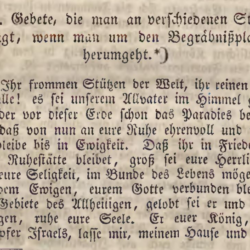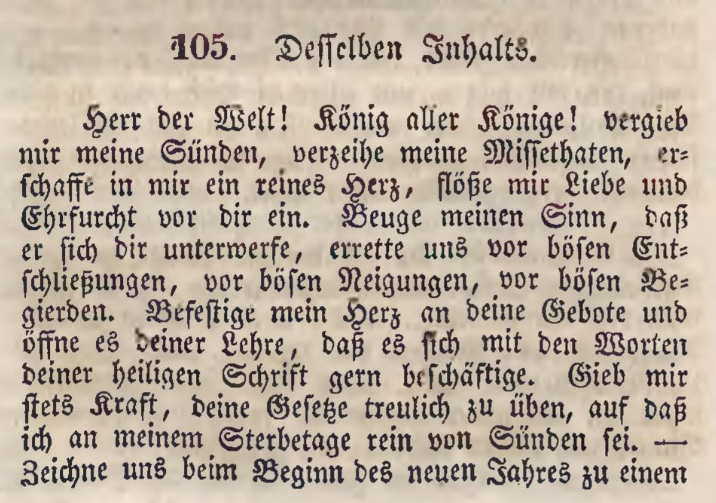TOGGLE COLUMNS (on/off):ADJUST COLUMN POSITIONS: select the column header cell and drag it where you want. show me!COPY INDIVIDUAL COLUMN(S): use CopyTables, a browser extension.
| Source (German) | Translation (English) |
|---|---|
Gebet wenn man auf den Begräbnißplatz kommt |
Prayer when you come to the burial ground. |
Gelobt sei der Ewige, unser Gott, der Herr, der euch nach Gerechtigkeit erschaffen, ernährt und verpflegt hat, und der euch nach Gerechtigkeit hat sterben lassen, der eure Anzahl kennt, und euch einst wieder aufleben lassen wird, nach Gerechtigkeit. Gelobt seist du Ewiger, der du die Todten belebest. |
Praise be to the Eternal, our God, the Lord, who created you, fed and nourished you according to fairness, and caused you to die according to fairness, who knows your number, and will one day revive you according to fairness. Praise be to you Eternal One, who revives the dead. |
Du bist in Ewigkeit mächtig, o Gott, du belebest die Todten, mächtiger Erretter, du erhältst die Lebenden mit Güte und belebst die Todten mit großer Barmherzigkeit; du bist die Stütze der Wankenden, das Heil der Kranken, und der Befreier der Gefesselten. Du hältst ihnen treulich deine Zusage, jenen die in der Erde schlummern. Wer gleicht dir, Herr der Allmacht! wer ist dir ähnlich? König des Todes und des Lebens, Spender des Heils, du bist der Verheißung getreu, die Verstorbenen einst wieder zu beleben. |
You are mighty forever, O God, you revive the dead, mighty Savior, you sustain the living with goodness, and revive the dead with great mercy; you are the support of the tottering, the salvation of the sick, and the deliverer of the bound. You faithfully keep your promise to them, to those who slumber in the earth. Who resembles you, Lord of Omnipotence! who is like you? King of death and life, giver of salvation, you are faithful to the promise to revive the dead one day. |
Darum ist es unsere Pflicht, dir zu danken, und deinen großen, mächtigen und ehrfurchtbaren Namen als einzig anzuerkennen. Nichts ist dir gleich zu achten, Gott unser Herr! in dieser Welt; und nichts ist ohne dich, unser König, im Leben einer künftigen Welt. Vergänglich ist alles, ohne dich, unser Erlöser, in den Tagen der Erlösung, und nichts ist dir ähnlich, unser Erretter, beim einstigen Aufleben der Todten. |
Therefore, it is our duty to thank you and acknowledge your great, mighty and awesome name as unique. Nothing is equal to you, God our Lord, in this world; and nothing is without you, our King, in the life of a future world. All things are transitory without you, our Redeemer, in the days of redemption; and there is nothing like you, our Savior, at the resurrection of the dead. |
“Gebet wenn man auf den Begräbnißplatz kommt” was translated/adapted by Yehoshua Heshil Miro and published in his anthology of teḥinot, בית יעקב (Beit Yaaqov) Allgemeines Gebetbuch für gebildete Frauen mosaischer Religion. It first appears in the 1829 edition as teḥinah №31 on pp. 40-41. In the 1835 edition it appears as teḥinah №96 on p. 193.
We welcome corrections and improvements. The transcription of the German from Latin script in Fraktur type provided machine-readable text for a machine translation by DeepL, which we then edited for accuracy and clarity. –Aharon Varady
Source(s)



“Gebet wenn man auf den Begräbnißplatz kommt | Prayer when you come to the burial ground, a teḥinah by Yehoshua Heshil Miro (1829)” is shared through the Open Siddur Project with a Creative Commons Attribution-ShareAlike 4.0 International copyleft license.










Comments, Corrections, and Queries